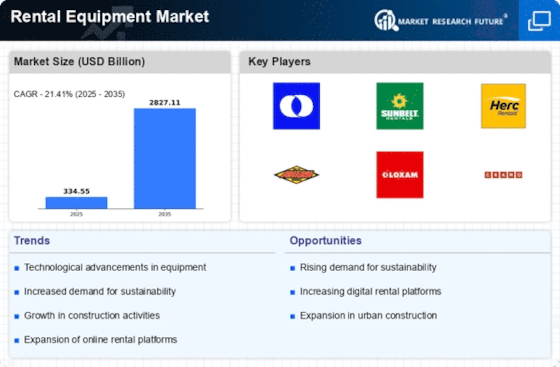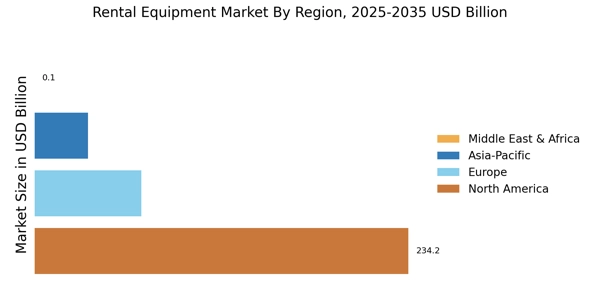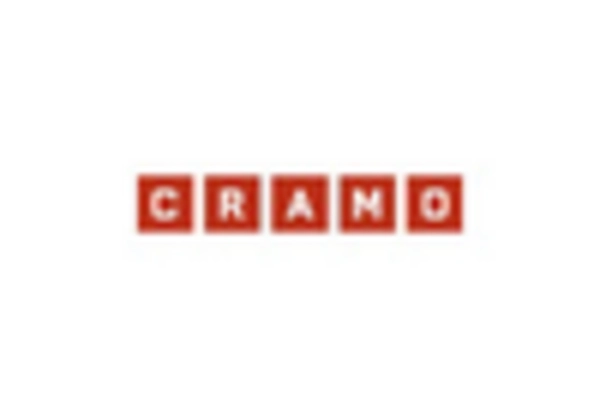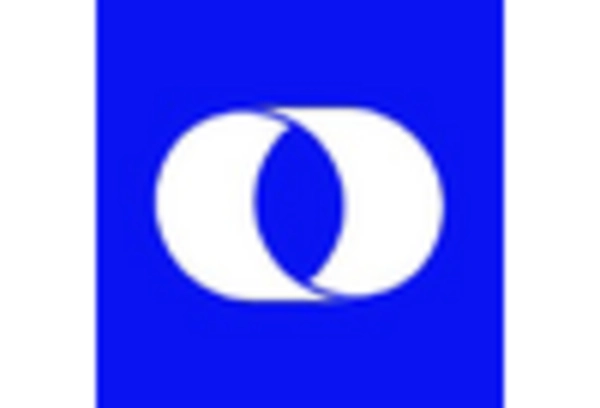Expansion of Rental Networks
The Rental Equipment Market is benefiting from the expansion of rental networks, which enhances accessibility and service delivery. As rental companies establish more locations and partnerships, they are able to reach a broader customer base, including remote and underserved areas. This expansion is facilitated by advancements in project logistics and supply chain management, allowing for efficient equipment distribution. In 2025, it is expected that the number of rental outlets will increase by approximately 15%, reflecting the growing demand for rental services. This trend is likely to enhance customer satisfaction and loyalty, as clients gain easier access to the equipment they need. Consequently, the expansion of rental networks is poised to play a crucial role in the continued growth of the Rental Equipment Market.
Adoption of Advanced Technologies
The integration of advanced technologies within the Rental Equipment Market is reshaping how equipment is utilized and managed. Innovations such as telematics, IoT, and AI are enhancing equipment monitoring and maintenance, leading to improved operational efficiency. For instance, telematics systems allow rental companies to track equipment usage in real-time, optimizing fleet management and reducing downtime. This technological adoption is expected to increase the overall value proposition of rental services, as clients benefit from enhanced performance and reliability. As of 2025, it is estimated that the market for telematics in rental equipment could reach USD 1.2 billion, indicating a strong trend towards technology-driven solutions in the Rental Equipment Market.
Increased Construction Activities
The Rental Equipment Market is experiencing a surge in demand due to heightened construction activities across various sectors. As urbanization continues to expand, the need for construction equipment rental has become more pronounced. In 2025, the construction sector is projected to grow at a rate of approximately 5.5% annually, driving the need for rental equipment. This trend is particularly evident in infrastructure projects, where companies prefer renting over purchasing to manage costs effectively. The flexibility offered by rental agreements allows construction firms to adapt to project requirements without the burden of ownership. Consequently, this dynamic is likely to bolster the Rental Equipment Market, as businesses seek to optimize their operational efficiency while minimizing capital expenditure.
Growing Demand for Cost-Effective Solutions
In an era where cost management is paramount, the Rental Equipment Market is witnessing a growing preference for cost-effective solutions. Businesses are increasingly recognizing the financial advantages of renting equipment rather than purchasing it outright. This trend is particularly prevalent among small to medium-sized enterprises that may lack the capital for significant investments. The rental model allows these businesses to access high-quality equipment without incurring substantial upfront costs. As of 2025, it is projected that the rental market could account for nearly 30% of total equipment spending, underscoring the shift towards rental solutions. This economic rationale is likely to further propel the Rental Equipment Market as companies seek to optimize their budgets while maintaining operational capabilities.
Environmental Regulations and Sustainability
The Rental Equipment Market is increasingly influenced by stringent environmental regulations and a growing emphasis on sustainability. Companies are under pressure to reduce their carbon footprints and comply with environmental standards, which often necessitates the use of modern, efficient equipment. Rental services provide an attractive solution, as they typically offer newer models that meet these regulations. Furthermore, the rental model promotes resource sharing, which aligns with sustainability goals by reducing the overall number of machines in circulation. As of 2025, it is anticipated that the demand for eco-friendly rental equipment will rise significantly, potentially increasing the market share of sustainable rental solutions within the Rental Equipment Market. This shift not only addresses regulatory compliance but also appeals to environmentally conscious consumers.

















